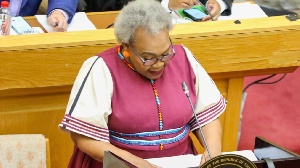Africa News of Thursday, 5 June 2025
Source: www.ghanawebbers.com
South Africa: What The Child Protection Pledge Needs to Succeed
The plan to protect children faces challenges. There is dysfunction in social development departments. Relations with NGOs, which provide most services, are strained.
In the past financial year, about 1,100 children were murdered in South Africa. According to SAPS crime statistics, around 1,181 children faced attempted murder. Additionally, 6,209 children were seriously assaulted in just three quarters of the 2024/25 financial year.
South Africa has a serious issue with violence against children. As national Child Protection Week begins, those responsible must take action.
In November 2024, the first Global Ministerial Conference on Ending Violence Against Children occurred in Bogotá, Colombia. South Africa's Social Development Minister Sisisi Tolashe joined ministers from 102 countries. They pledged an ambitious plan to prevent and respond to violence against children.
South Africa committed to several actions by 2027. One action is implementing evidence-based parenting programs in 52 districts. This aims to create safe home environments and reduce child abuse.
Another commitment is enforcing the Basic Education Laws Amendment Act by 2027. This law strengthens the ban on corporal punishment in schools and increases penalties for its use.
South Africa also pledged to provide psycho-social services for parents and caregivers around the clock. The goal is to expand the Child Protection Programme of Action across all districts and enhance support for caregivers against online violence.
Meeting these targets could help keep children safe and reduce overall violence in South Africa. Violence against children has significant costs for individuals and families as well as the state.
A study from Save the Children South Africa found that such violence costs R238.58 billion annually—about 6% of GDP. These figures are outdated; costs have likely increased since then.
Investing in prevention can save money while improving school completion rates and reducing unemployment.
Making this pledge a reality benefits all South Africans. Civil society organizations support this effort but face challenges working with the Social Development Department.
The department has treated NGOs poorly, risking many lives due to mistrustful relationships that need improvement. While Tolashe presented her plan, a court ruling forced Gauteng's Social Development Department to pay NGOs overdue payments for seven months.
This funding issue isn't due to lack of finances; Gauteng underspent its budget by half a billion rand last year.
Similarly, KwaZulu-Natal hasn't paid NGO service providers for work done earlier this year. This leaves organizations unable to cover staff salaries or provide essentials like food for children.
Departmental social workers may assist with services promised but are already overwhelmed with serious cases of abuse and neglect.
Without NGOs' support, fulfilling pledges to prevent violence against children will be difficult.
Positive steps include implementing the Sector Funding Policy (SFP). This policy prioritizes children's services and allows multi-year funding for NGOs providing essential services.
Funding certainty would improve sector stability and repair relationships between departments and service providers.
However, SFP implementation is absent from planning documents; signs indicate under-capacity within national departments.
Since 2020/21, there has been no clean audit from the national department.
These issues reflect ongoing mismanagement and poor planning within social development departments at all levels.
The minister must recognize that current practices are ineffective and prioritize strong leadership focused on delivery.
To fulfill its important pledge effectively, the minister must mend relationships with NGOs while being accountable for departmental failures.
Officials should address family issues holistically rather than treating each member's problems separately.
For South Africa’s future success, children's well-being is crucial; families need integrated services.
Civil society organizations stand ready to collaborate with the department toward creating a safer environment for children.
They can no longer tolerate inefficiency undermining vital services for families and children.
Chandré Gould: Senior Research Fellow at Justice and Violence Prevention
Gugu Xaba: Executive Director at Save the Children South Africa
Suzan Eriksson: Independent Consultant
Wilmi Dippenaar: Director at South African Parenting Programme Implementers Network
Monica Woodhouse: Member of South African National Child Rights Coalition











